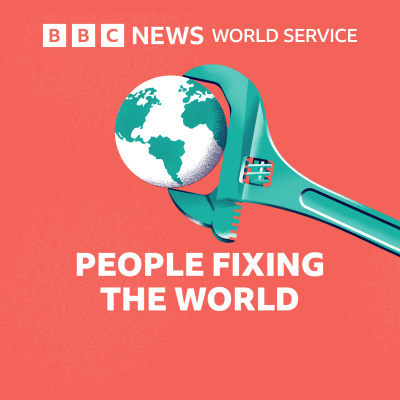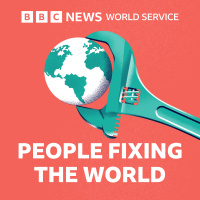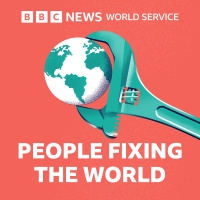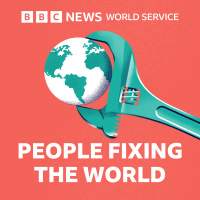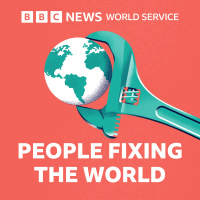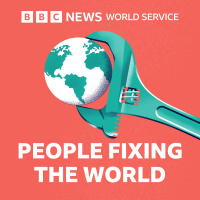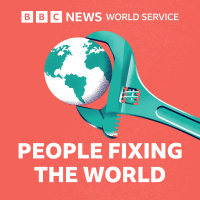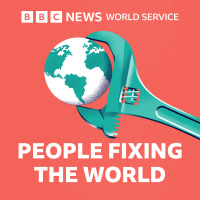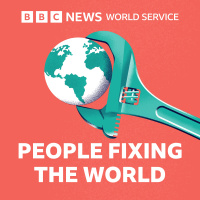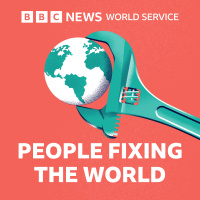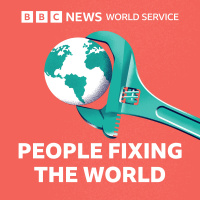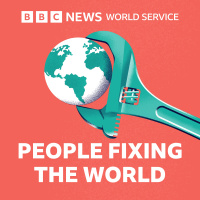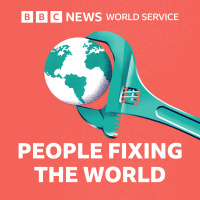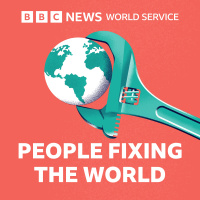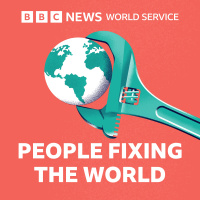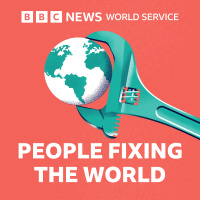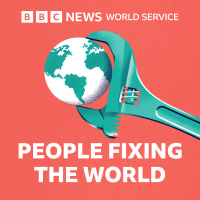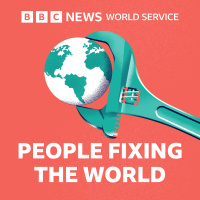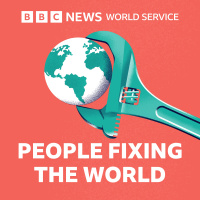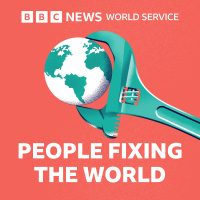Sinopsis
Brilliant solutions to the worlds problems. We meet people with ideas to make the world a better place and investigate whether they work.
Episodios
-
Shockwaves for the heart
19/09/2023 Duración: 23minHeart disease and other cardiovascular diseases are the biggest killer in the world, causing 18 million deaths globally every year.Cardiologists and heart surgeons try to manage heart disease with stents, surgery and drugs, but the organ itself does not heal. Finding a way to regenerate heart tissue has become a holy grail for medicine.Now there is new hope from a strange and pioneering technique from Austria. Doctors there believe that applying shockwaves directly to the heart after surgery dramatically improves patient outcomes.The shockwaves – which are sonic pressure waves, rather than electric shocks – lead to new growth of blood vessels and trick the body’s immune system into action.The BBC’s global health correspondent Naomi Grimley travels to Innsbruck to see the treatment in action.Presenter: Myra Anubi Producer: William Kremer Series producer: Tom Colls Sound mix: Hal Haines and Gareth Jones Editor: Penny MurphyEmail: peoplefixingtheworld@bbc.co.ukImage: Heart surgery
-
Genetic problem-solving
12/09/2023 Duración: 23minFrom crops that grow faster to rice that could stop children going blind - the world is full of genetically modified products waiting to come onto the market.Genetic modification techniques in plants have huge problem-solving potential, but are often clouded in controversy. Most scientists say GM food is safe, yet some consumers and environmental campaigners remain unconvinced.This week we look at the potential, and the controversy, in this futuristic field.Presenter: Myra Anubi Reporter: Lizzy McNeill Series producer: Tom Colls Sound mix: Annie Gardiner Editor: Penny MurphyEmail: peoplefixingtheworld@bbc.co.ukImage: Illustration of a strand of DNA (Getty Images)
-
Female farmers fighting sexism
05/09/2023 Duración: 23minIn Bangladesh, there’s an app helping female farmers to get a fairer price for their crop.At the market, women farmers often face sexism, and struggle to sell their produce for what it’s worth. But by making the seller anonymous, they’re able to sell more and reap the profit they deserve.We’ll also hear from other projects around the world trying to bridge the gender gap in agriculture- and investigate how supporting female farmers doesn’t just help with reducing inequality – it can also help fight poverty, hunger and climate change.Also on the programme - a remote control for cows and goats which lets farmers control them with virtual fences on their phone.Presenter: Myra Anubi Producers: Craig Langran and Zoe Gelber Reporter: Salman Saeed Series producer: Tom Colls Sound mix: Hal Haines Editor: Penny MurphyEmail: peoplefixingtheworld@bbc.co.ukImage: A female farmer in Bangladesh
-
Surprising solar
01/08/2023 Duración: 25minThe fast growth of solar power is a success story in the fight against climate change. However, in some countries progress is being stymied by opposition to large solar farms in the countryside.But enterprising people are trying to keep the solar momentum going, by finding less obvious places where we can harness energy from the sun - like lakes, farms, car parks, office windows and even outer space.Presenter: Myra Anubi Reporter: William Kremer Series Producer: Tom Colls Sound mix: Hal Haines Editor: Penny Murphyemail: peoplefixingtheworld@bbc.co.ukImage: Floating solar (Credit: Ocean Sun)
-
The bubble barrier cleaning up rivers
25/07/2023 Duración: 24minHow can we stop plastic flowing into our oceans? Dutch inventors have one solution, pulling plastic from the water using a ‘net’ made from bubbles. Also on the programme - how sound could be used to help restore coral reefs in Australia. Scientists found playing the sounds of a healthy reef under water, could attract fish back to the site. They hope to combine this with coral seeding to rebuild reefs teeming with life. And our last solution keeps with the water theme - looking at a hand-cranked washing machine that makes laundry quicker and easier for some of the poorest women in society. Presenter: Myra Anubi Producer/Reporter: Claire Bates Producer/Reporter: Richard Kenny Series Producer: Tom Colls Sound Mix: Hal Haines Editor: Penny Murphy email: peoplefixingtheworld@bbc.co.ukImage: Philip Ehrhorn (BBC)
-
Eating invasive species
18/07/2023 Duración: 24minAll across the world, invasive species are on the march. These are plants and animals that take over new areas, throwing nature out of balance. If left unchecked, they can destroy local ecosystems, drive native species to extinction - and put local livelihoods at risk.But people have been finding innovative ways to combat these invaders… like eating them!In Belize, we look at how encouraging local fisherman and restaurants to catch and serve up invasive lionfish has helped control their numbers and protect the local reefs.Meanwhile in Nashville, Tennessee, we see how one urban shepherd is deploying his flock of sheep - dubbed the ‘Nashville Chew Crew’ - to eat invasive plants and weeds across the city.Presenter: Myra Anubi Reporter: Marisol Amaya Producer/Reporter: Zoe Gelber Series Producer: Tom Colls Sound Mix: Hal Haines Editor: Penny Murphyemail: peoplefixingtheworld@bbc.co.ukImage: A lionfish (Getty Images)
-
The game that fixes cities
11/07/2023 Duración: 25minIn cities across Japan and the Philippines, an app called Tekkon is making data collection cool.It's a Pokemon GO-style game which pays people with cryptocurrency if they track down broken infrastructure – such as missing manhole covers and tangled electrical wires.The same technology that makes the cryptocurrency possible - blockchain - is also being used in South Africa to improve the lives of rubbish collectors.We investigate how this cutting-edge technology is attempting to solve some everyday problems.Presenter: Myra Anubi Producer / Reporter: Craig Langran Reporter: Michaela Papa Series producer: Tom Colls Sound Mix: Hal Haines Editor: Penny Murphyemail: peoplefixingtheworld@bbc.co.ukImage: Isaiah Demdam
-
The power of a backstory
04/07/2023 Duración: 23minHow do you care for someone properly in a hospital or care home if you don’t know who they are?With US hospitals and care homes seeing fast turnovers of staff, many clinicians don’t get the chance to learn their residents’ backstories. This can lead to patients feeling isolated and misunderstood. Meanwhile, staff miss out on valuable insights which could be incorporated into treatment plans or used to make someone’s hospital stay more comfortable.But a start-up called MemoryWell is working to fix this by hiring professional writers to create short biographies of residents that get pinned up on their walls. It’s helping staff personalise care for patients and it’s led to valuable points of connection at what can be a difficult and lonely time.Presenter: Myra Anubi Reporter/producer: William Kremer Series producer: Tom Colls Sound mix: Hal Haines Editor: Penny MurphyEmail: peoplefixingtheworld@bbc.co.ukImage: Dot being interviewed for her biography.
-
Fighting the heat
27/06/2023 Duración: 24minAs climate change leads to global temperature rises, cities around the world are being faced with extreme levels of heat. This can bring whole cities to a halt, disrupt key infrastructure, and for the most vulnerable in society heat can be a killer. But where there’s a problem, innovation is never far behind. We meet the people who are trying to find solutions – from urban designers finding inspiration in ancient technologies to keep cities cool, to social projects offering simple solutions to vulnerable populations. Presenter: Myra Anubi Producer/Reporter: Lizzy McNeill Series Producer: Tom Colls Sound Mix: Annie Gardiner Editor: Penny Murphy Email: peoplefixingtheworld@bbc.co.uk Image: A hot child.
-
Turning mud into ‘clean’ concrete
20/06/2023 Duración: 24minA young scientist has developed a white powder which gives waste soil concrete-like properties.Gnanli Landrou grew up in Togo, helping his neighbours dry out soil to make bricks, and his big dream is to help people like them build stronger, cheaper, houses.But the European building industry is also excited about his new, low carbon building material.We talk to Gnanli about his ambitions for this extraordinary powder, and meet the Swiss architect who is about to build a luxury apartment block with it.This episode was first broadcast in May 2022.Presenter: Myra Anubi Reporter: Jo Mathys Series producer: Tom Colls Sound mix: Hal Haines Editor: Penny MurphyEmail: peoplefixingtheworld@bbc.co.ukImage: Gnanli Landrou
-
Palm oil that’s better for wildlife
13/06/2023 Duración: 24minIs it possible for palm oil plantations, wildlife and the rainforest to happily coexist?Products containing palm oil, including soaps and cosmetics, are used by billions of people worldwide. While the industry is credited with reducing poverty in countries like Indonesia and Malaysia, it has also contributed to mass deforestation.In Malaysian Borneo, only small pockets of pristine rainforest remain, with much of the land taken over by mile after mile of palm oil plantation. But on one plantation, an NGO called Hutan has joined forces with the palm oil growers to try and make them better for nature.We visit the plantation to see how they're using wildlife corridors to connect the remaining islands of forest.Presenter: Myra Anubi Reporter: Craig Langran Series producer: Tom Colls Sound mix: Hal Haines Editor: Penny MurphyEmail: peoplefixingtheworld@bbc.co.ukImage: An orangutan (Credit: Getty Images)
-
Catching the ‘bike bus’
06/06/2023 Duración: 24minHow can you get kids to school safely in a way that’s good for the environment and gives them some exercise too? We find out how kids from Spain to Scotland are joining together in long convoys known as “bike buses”. Teachers and parents accompany the joyful multitude of cyclists, which pick up children from pre-determined stops along the way. And in Kenya, we look at a different kind of transport problem. Motorcycle taxis are used all over the world, but converting them to electric has proved a challenge. But a new kind of business in Kenya has found a neat solution. They’re hiring pre-charged batteries to the drivers so they can swap them without waiting around for a charge.Presenter: Myra Anubi Reporters: Claire Bates, Yusuf Jumah Producer: Zoe Gelber Series producer: Tom Colls Sound Mix: Anne Gardiner Editor: Penny Murphy
-
What to do with an empty mall?
30/05/2023 Duración: 24minUS shopping malls, once a mainstay of American life, are in decline. Forty malls have closed since 2020, while more than 230 department stores have closed in the same time period, according to Green Street, a real estate analytics firm.But where there is change, there is also opportunity.After Burlington High School in Vermont had to close its doors because dangerous chemicals were found, the school hopped into a site vacated by Macy’s department store five years earlier.The children now ride the escalator to class. Elsewhere, malls have been converted into offices, casinos or large healthcare facilities. We explore the surprising second life being offered to these temples of consumerism.Presenter: Myra Anubi Reporter: William Kremer Series producer: Tom Colls Sound Mix: Anne Gardiner Editor: Penny MurphyEmail: peoplefixingtheworld@bbc.co.ukImage: Pupils at a school in a department store.
-
Helping elephants and humans get along
23/05/2023 Duración: 25minAs humanity expands further and further into the wild areas of the world, they are increasingly coming into conflict with the creatures that live there. One of those animals is the elephant. When tensions flare with these huge creatures, lives can be lost on both sides. We investigate the people trying to resolve these conflicts in a peaceful, bloodless way - like the farmers placing beehives on their fences in Kenya to ward off elephants looking to eat their crops. Because despite their size, it turns out that elephants are scared of bees.And in India, we meet a woman who is making trying to make sure people get the compensation they deserve when animals damage their land - so they don't let their anger out on the animals.Presenter: Myra Anubi Reporter: Michael Kaloki Reporter/producer: Lizzy McNeill Series producer: Tom Colls Sound mix: Anne Gardiner Editor: Penny Murphy Email: peoplefixingtheworld@bbc.co.uk Image: An African elephant (Credit: Getty Images)
-
Dementia friendly neighbourhoods
16/05/2023 Duración: 27minHow do you help older people, and particularly those with dementia, to remain independent for longer? In Singapore, where dementia affects roughly 1 in 10 people over 60, the government are betting that the re-designing neighbourhoods with an aging population might just be the answer. Reporter Craig Langran visits the Singaporean suburb of Nee Soon – an area of public housing which has been overhauled by a team of healthcare experts, designers, and residents – and looks at some of the other innovations in elderly care taking place in the country. And we look at a village in France where everything has been designed especially for people with dementia. Presenter: Myra Anubi Reporter: Craig Langran Series producer: Tom Colls Sound mix: Gareth Jones Editor: Penny Murphy Email us: peoplefixingtheworld@bbc.co.uk Image: Leong Leng Nan and Ng Ha Dui
-
Making peace with nature
09/05/2023 Duración: 24minMany of the world’s most violent conflicts happen in the midst of some of its most valuable natural wildernesses. But protecting these areas’ biodiversity cannot happen until the fighting stops.We look at how nature itself can be used to help build that peace, with a project in Colombia training former guerrilla fighters to create their own ecotourism initiatives.They are protecting nature while integrating the former fighters back into society, following the end of Colombia’s civil war in 2016.Presenter: Myra Anubi Reporter: Zoe Gelber Series producer: Tom Colls Sound mix: Gareth Jones Editor: Penny MurphyEmail: peoplefixingtheworld@bbc.co.uk Image: Former FARC member Cesar
-
Menopause mentors
02/05/2023 Duración: 25minThe menopause is something half the world’s population goes through. But despite this, it’s still not much talked about - and in some places, remains taboo.Which means many women hit this stage of life not understanding what’s happening to them.We join a menopause cafe where people share experiences face-to-face, try out an app giving Indian women practical advice, and hear about workshops in Argentina where women learn how to replace expensive menopause products with cheaper items like coconut oil.Presenter: Myra Anubi Reporters: Ann Hepburn and Claire Bates Series producer: Tom Colls Sound mix: Gareth Jones Editor: Penny MurphyEmail: peoplefixingtheworld@bbc.co.ukImage: Rachel Weiss at a menopause cafe
-
Fighting corruption in schools
25/04/2023 Duración: 24minParaguay, like much of the world, has a problem with corruption. But a project in the country is trying to change that, by starting with the next generation.Founded by David Riveros - who started his fight against corruption as a teenager - reAccion Paraguay works by providing schools with all the information they need to track the funds owed to them.They then show teachers, parents and pupils how to collect evidence that the money hasn't arrived, so they can put pressure on the government to act.We travel to Paraguay to find out more.Presenter: Myra Anubi Reporter: Jane Chambers Series producer: Tom Colls Sound mix: Hal Haines Editor: Penny MurphyEmail: peoplefixingtheworld@bbc.co.uk Image: David Riveros
-
The hidden powers of bacteria
18/04/2023 Duración: 23minMany people associate bacteria with dirt and disease. But a lot of bacteria are good for us. And scientists around the world are using them to help us do all sorts of useful things like recycle, clean up waste and produce food. We find out how bacteria are salvaging metal from electronic waste. We taste the protein-rich food additive that is made from bacteria. Plus, we explore how bacteria are helping to reduce the impact of farming on the environment. Presenter: Myra Anubi Reporter: Rosie Blunt Series producer: Tom Colls Sound mix: Hal Haines Editor: Penny Murphy Thanks to Prof Sebastien Farnaud, Coventry University Email: peoplefixingtheworld@bbc.co.uk Image: Computer illustration of bacteria (Getty images)
-
Work: Access for all
11/04/2023 Duración: 23minLa Casa de Carlota isn’t like most workplaces. The design studio, based in Barcelona, Spain, employs creatives who have intellectual disabilities, autism and schizophrenia.Working together with non-disabled colleagues, they produce striking graphics for campaigns and packaging, as well as original works of art. This isn’t a government-backed scheme to help out a disadvantaged group, but a winning formula that is helping the studio forge a unique brand.In this programme we look at two companies who have realised there is strength in neurodiversity and hear from Natalie Duo from the charity Mencap. The vast majority of people with learning disabilities are unemployed, so how can other businesses can follow suit?Programme originally broadcast in April 2022.Presenter: Myra Anubi Reporter: William Kremer Executive producer: Tom Colls Editor: Penny MurphyImage: Casa de Carlota
